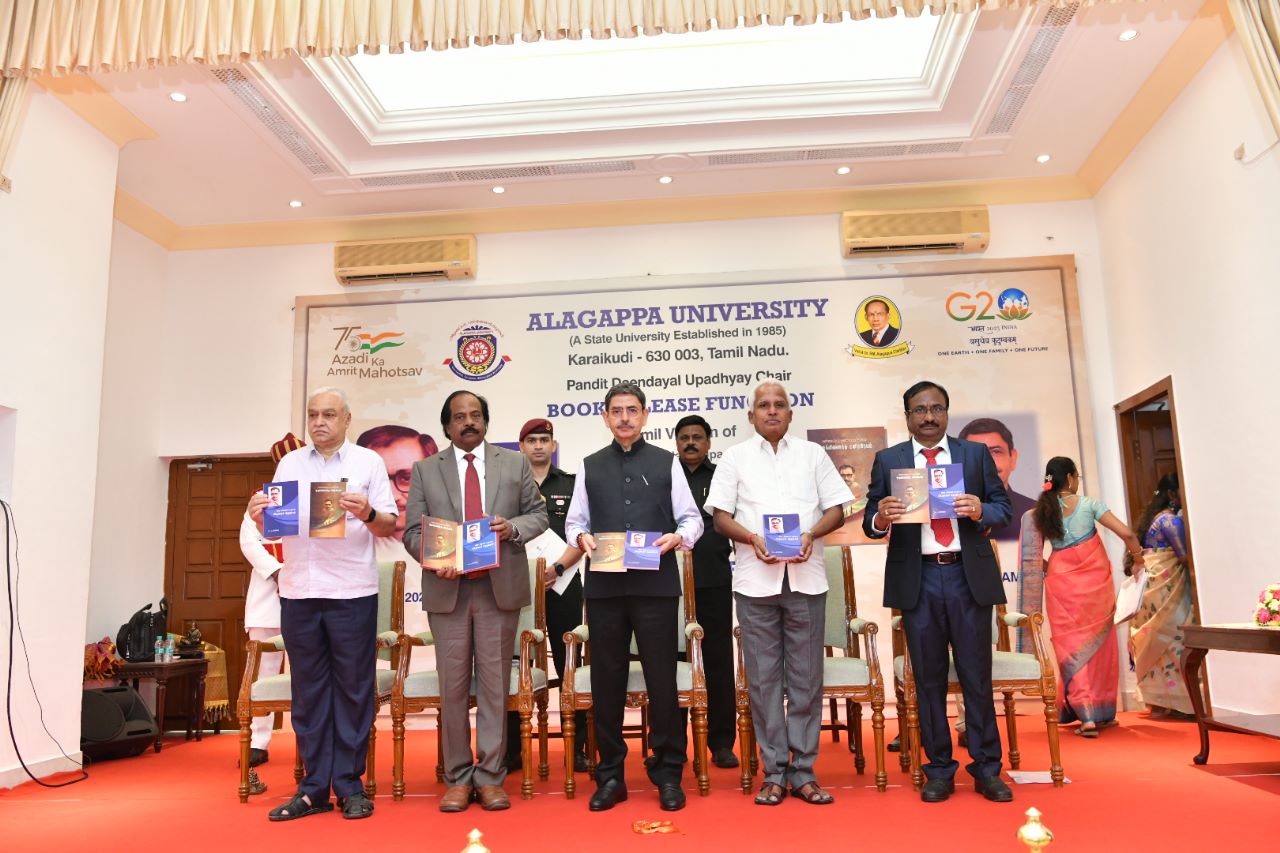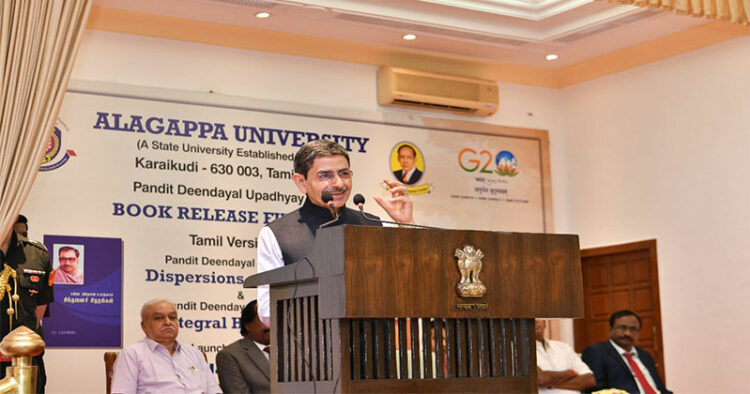Tamil Nadu Governor R N Ravi said, “Karl Marx theory was rejected because, this model created divisions between and within different segments. It triggered perpetual conflict in society.”
He said this at a function after releasing the book “Pt. Deendayal Upadhyaya: Dispersions of thought” & “Pt. Deendayal Upadhyaya: Integral humanism” held on January 21 at Raj Bhavan, Chennai. He said Pandit Deen Dayal Upadhyaya’s essential humanity is a contemporary interpretation of Sanatan Adhyatm, deeply rooted in every ‘Bharatiya’ heart and soul.

Today as our country progresses, the integral humanism of Deendayal Upadhyaya is witnessed. ‘Sanatan Dharma’ is so comprehensive that there is no Pegan or infidel. They all are part of the same family, all-inclusive, bounded by the law of the universe called ‘Dharma’. It is in Sanskrit and our ancient Tamil poetic work, “Puranaanooru”, which says “Yaadhum Oore Yaavarum Kaelir”.
Elaborating further, Governor Ravi said we had committed a grave mistake by misunderstanding and misusing the term ‘Dharma’ as the English counterpart of ‘religion’. Governor reiterated Dharma as the eternal law of the universe by which we all have to abide. “British rule has caused Bharat’s social, cultural, and civilisational destruction.
After Independence, we were supposed to rebuild our country in a way the soul of our nation demanded, but we lost track. We kept parroting the same colonial attitude, and our policies were heavily skewed towards western ideas and ideologies. It further intensified the problems, as we had many hungry, illiterate, sick, and poor people. This also resulted in regional imbalances; even in the most developed States, sub-regional imbalances are prominent, including in our State of Tamil Nadu,” he pointed out.
Highlighting the Western ideologies, he said, “Theology, Darwinian theory, Karl Marx theory, and Rousseau’s social contract theory caused damage to our national growth”. Governor Ravi explained, “Theology which believed in anthropocentric view of life, where humans are at the centre of creation and the rest of the creations were meant for human pleasure. It created reckless exploitation of natural resources, the conflict between humans and nature, and resulted in the climate crisis. The Bharatiya Darshan, on the other hand, believed that we are all a part of creation and are inextricably linked, whether we are humans, animals, or non-living. We are all the children of the same mother earth”.
He said that the Darwinian Theory, which insists on the survival of the fittest, meant weak people had no right to exist, and only the strong prospered. It is the law of the jungle where there is no compassion or sense of right or wrong. But the ‘Bharatiya Darshan’ believed in the survival of collectives with compassion, Karl Marx’s theory, and perpetual conflicts between haves and have-nots nots raised. As per the theory, ‘have nots’ has to prevail, and this idea spreads like a virus. This model created divisions between and within different segments. It triggered perpetual conflict in society”.
Governor Ravi said, “Rousseau’s social contract theory, he looked upon the origin and relationship between an individual, a society, and a State as a “contract.” It considers individual as the primary stakeholder and supports the supremacy of the individual over collectives, and State and society as product. Like six blind men and an elephant, everyone looked at part of it, but nobody looked at it in totality. Our educated people keep quoting western thinkers and philosophers as if there is nobody from this country. They quote Abraham Lincoln for promoting democracy “of the people, by the people, for the people,” but forget that the same person didn’t allow women to vote and did not consider black’s human. They praise Lincoln for abolishing slavery, who said, “I would be the last person to abolish slavery”. It is recorded history. This is nothing but the colonisation of our minds”.
He said, “Today, India is the fifth largest economy in the world, and in five to six years, we will be the third largest economy in the world, and by 2047, we will be the largest economy in the world. The whole world looks upon India’s credible story and growth. They look at India as an engine of global recovery. After the pandemic, the world was in a recession-like situation, but India still managed to develop. When world powers produced vaccines, they encapsulated the situation and looked at it as an opportunity to make money. But India developed its own vaccines and provided them to nearly 150 nations for free. India’s vaccines are still regarded as among the best in the world. Today, we are comprehensively resurging with compassion. What brought this transformation is the way we look at our country.
Earlier, we looked at this country from western perspective. But under the visionary and inclusive Central leadership, today we look at our country from ‘Bharatiya’ perspective as one family. As a result, we are attaining incredible results. In the field of clean energy, Nari Shakti (Beti Bachao Beti Padhao, cooking gas) building better connectivity (road and optical fibres) the comprehensive and bold approach are showing splendid outcomes. We achieved this because we looked at the country’s problem not piecemeal but as a whole. When the national leadership gives a call, it touches the soul of Bharat, and the whole nation keeps its trust in him”.
“With the creative and collective energy of 1.3 billion people, the nation is marching towards its destiny in this ‘Amrit Kaal’. Earlier, the model of Governance was based on patronage. Only when our people grow with dignity will our Bharat grow and the world will be safe,” he said.
He called upon the young scholars to come forward to study, conduct research, and write books, essays, and Op-Eds and encouraged them to hold intellectual churning on new ideas to make our academic space are made free from colonised minds and understand and explore who we are.
Prof M Krishnan, Vice-Chancellor, Central University of Tamil Nadu, Tiruvarur; Prof Kanakasabapathy, former Chairperson, ICSSR, New Delhi, Auditor R Sundaram, Author of the book and Prof Thiru Dharmalingam, Officials of Raj Bhavan, University faculties, professors, teachers and students participated in the function.




















Comments